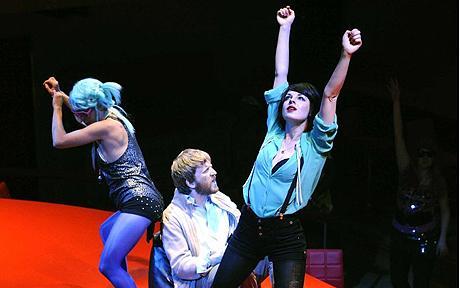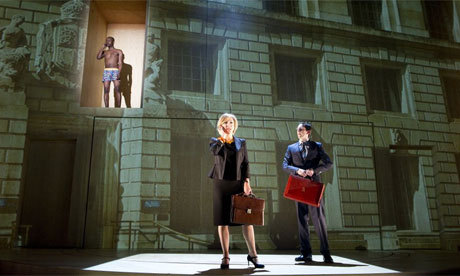“The thing the sixties did was to show us the possibilities and the responsibility that we all had. It wasn’t the answer. It just gave us a glimpse of the possibility.”
― John Lennon
‘It’s the end of the world as we know it’ REM
Cambridge Arts Theatre

‘Earthquakes in London’ has proved a blast with critics as well as sending shockwaves intended to make the audience sit up and listen. Bartlett’s play, currently coming to the end of its two month run, is a refreshing take on the climate change debate, combining hard hitting facts and topical issues with a futuristic blend of pop culture and the buzz of the swinging sixties. You are immediately swept away into a whirlwind that begins in 1968 and spans all the way through to 2025 with a key emphasis on now and what we do from here. The shifting backwards and forwards in time as well as the drinking, drugs, smoking and dancing leaves you feeling a little less than grounded and the impending earthquake threat seems all the more tangible.
The play focuses on family: three sisters who destroy themselves – Freya the teaching assistant, Jasmine the wayward child of the present day, and the Liberal MP Sarah – and their non-existent relationship with their disillusioned scientist father Robert (who initially sells out on his principles for the sake of a quick buck) and their lost relationship with their mother (earth). The links between these characters and their troubled relationships add another dimension to saving the planet, that you need to love and care for one another. The future generation (Emily, Freya’s daughter) needs to be protected, not simply written off – as the father wants to do – because there is no hope left and he has given up. The family tears itself apart because none of its members value love, responsibility or nurture – until it is too late. When he does finally return to his principles he sells himself short of a future ‘I should never have had any of you’.

Excellent cast performances combined with a good script ensure a great evening. Like the best writing, the script combines poignant moments with sharp comedy, making the former all the more effective and memorable. When the extinction-facing polar bear (played comically with a Welsh accent) tries to attract the attention of a harassed commuter who claims ‘I’m busy’ the bear retorts ‘I’m dead.’ It cleverly uses elements of the present day to make its message even more relevant: The betrayal of a coalition government, the preoccupation with endless materialism and the Jeremy Clarkson approach to climate change: close your eyes and it’s not there. ‘We know there’s nothing we can do so we’re drinking and dancing as fast as we can’ (Robert played by the excellent Paul Shelley). This is reflected in the brilliant Brechtian-tinged but frantic stage production and revolving that leaves you feeling dizzy, if not slightly high.
The role of Freya is crucial to the plot. She is the goddess of love, fertility, battle and death. She represents both death and life, as she wants to kill herself and her baby, the future. Leah Whitaker, the narrator and protagonist played this demanding role excellently, voicing the collective unease and alienation of a lost people in the 21st Century. I spoke to Leah afterwards and she told me “When I get nervous or anxious about playing Freya I can actually use it to add to the character I’m playing…It’s a gruelling schedule for us performing for three hours on stage in the matinee and then in the evening as well but I usually just recharge my batteries with a cup of tea and a shower and then I’m ready to go again.”
Although a critical success, Rupert Goold’s production of Bartlett’s Earthquakes has been condemned by some for preaching its message whilst indulging in the ostentatious bright lights and glittery façade that it refutes. It turns from disco to catwalk to fable and for some, this interchange does not do the debate justice – it’s merely patronizing. It seems that Goold cannot win but he cleverly borrows from all genres to produce an exhilarating piece of theatre that engages your attention, excites the senses and gets you to consider your own existence in relation to the planet in the same three hours. Robert announces that there are six billion people on a planet that can only sustain one billion, and during the next century ” the earth will balance the books”, For me, the play’s success lay in hearing the response of the school children behind me, our future generation on which the play places such importance on. They laughed, cheered and applauded heartily – and I think they may have just listened to some of the stuff about the planet too.
